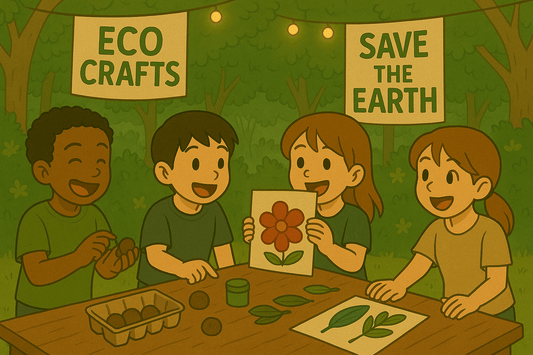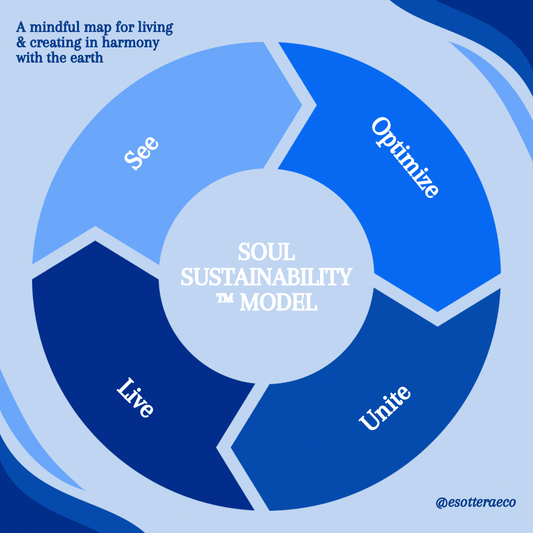
🌿 Day of Clean Air – September 7th: Breathing Life into Our Planet and Future Generations
“The air is the one thing that connects us all-across cities, countries, and continents. Let’s protect it for the future.”
- Unknown
💨 What is the Day of Clean Air?
The Day of Clean Air, observed on September 7th, is a day dedicated to raising awareness about the importance of clean air for health, the environment, and future generations. With air pollution being a major threat to both human health and the planet, this day serves as a reminder of the critical need to reduce emissions, promote cleaner air policies, and create a healthier world for all.
As a sustainable lifestyle brand, Esottera stands firm in its commitment to clean air and sustainable living, which is why we celebrate the Day of Clean Air. We recognize that our health, the health of our planet, and the future of our children are all intrinsically tied to the quality of the air we breathe. This blog post will explore the importance of clean air, the growing threats to air quality, and how we can all take action to contribute to cleaner air on September 7th and beyond.
🌎 Why Clean Air is Essential for Our Health and Planet
Air pollution is a global issue, affecting urban and rural areas alike. Poor air quality is linked to a variety of health problems, from respiratory diseases to cardiovascular issues. Additionally, air pollution is a significant driver of climate change, contributing to the warming of our planet. Let’s dive into why clean air is so crucial for both human health and environmental well-being.
🌱 1. Health Impacts of Air Pollution
The negative health impacts of air pollution are well-documented and widespread. According to the World Health Organization (WHO), air pollution is one of the leading environmental health risks, causing millions of deaths annually due to conditions like:
-
Respiratory diseases, such as asthma, bronchitis, and chronic obstructive pulmonary disease (COPD).
-
Cardiovascular diseases, which are often aggravated by exposure to fine particulate matter (PM2.5) and other pollutants.
-
Premature deaths, with children, the elderly, and those with pre-existing health conditions being particularly vulnerable.
Pollutants such as ozone, nitrogen dioxide (NO2), and sulfur dioxide (SO2), as well as tiny particles suspended in the air, can irritate the lungs, affect heart function, and worsen existing health conditions. In fact, clean air is not just a luxury-it is a necessity for maintaining health, especially in urban areas where pollution levels tend to be higher.
🌍 2. Climate Change and the Link to Air Pollution
The quality of the air we breathe is closely connected to climate change. Many of the same pollutants that contribute to global warming, such as carbon dioxide (CO2) and methane (CH4), also degrade air quality. These pollutants trap heat in the atmosphere, leading to rising temperatures, more frequent and severe storms, and shifts in weather patterns.
In addition to greenhouse gases, black carbon (soot) and ground-level ozone are significant contributors to both air pollution and climate change. Reducing these pollutants is critical not only for improving air quality but also for mitigating the impacts of climate change. Cleaner air helps to reduce warming and can lead to better outcomes for both human and ecological health.
🌱 3. The Environmental Impact of Poor Air Quality
While the health effects of air pollution are well-known, it is also crucial to understand the environmental consequences. Poor air quality contributes to acid rain, which damages ecosystems, soil, and bodies of water. Acid rain is formed when sulfur dioxide and nitrogen oxides react with water vapor in the air, creating acidic compounds that fall to the Earth’s surface.
Plants and wildlife are affected by these pollutants, as they can damage vegetation, interfere with plant growth, and disrupt the food chain. For instance, acid rain can harm crops and forests, reduce biodiversity, and negatively affect freshwater ecosystems. By improving air quality, we protect ecosystems and preserve biodiversity for future generations.
🌍 The Growing Threats to Air Quality
While air quality has improved in many parts of the world, there are still significant challenges that need to be addressed. The following are some of the most pressing threats to clean air:
🌿 1. Vehicle Emissions and Fossil Fuels
One of the largest contributors to air pollution is vehicle emissions, which release pollutants such as carbon monoxide (CO), nitrogen oxides (NOx), and particulate matter (PM). As the world’s population grows and more people rely on personal vehicles for transportation, emissions from cars, trucks, and buses continue to pose a major challenge to air quality.
Fossil fuels, such as coal, oil, and natural gas, are another significant source of air pollution. The burning of these fuels for electricity generation, industry, and transportation produces harmful emissions that not only degrade air quality but also contribute to climate change. A shift toward renewable energy sources and cleaner transportation options is crucial in reducing these emissions.
🌍 2. Industrial Pollution
Industrial pollution is another major source of air contamination. Factories, power plants, and manufacturing facilities release large quantities of pollutants, including sulfur dioxide (SO2), nitrogen oxides (NOx), and particulate matter (PM). These pollutants contribute to poor air quality, acid rain, and smog.
Industries also release volatile organic compounds (VOCs), which can react with nitrogen oxides in the atmosphere to form ground-level ozone, a dangerous pollutant that affects respiratory health and contributes to global warming. Transitioning to cleaner industrial practices, using renewable energy, and implementing better pollution control technologies can help reduce the harmful impacts of industrial activities.
🌱 3. Agricultural Emissions
Agriculture, while essential for food production, also contributes to air pollution. Methane (CH4) emissions from livestock, particularly cattle, are a potent greenhouse gas that exacerbates climate change. The use of fertilizers and pesticides can also release pollutants into the air, including ammonia (NH3) and nitrous oxide (N2O), both of which contribute to air quality degradation.
The increase in industrial agriculture and factory farming has led to higher levels of air pollution in rural areas. Sustainable farming practices, such as regenerative agriculture, crop rotation, and reducing livestock emissions, are essential in addressing this source of air pollution.
🌱 How to Celebrate the Day of Clean Air and Protect Our Health
The Day of Clean Air on September 7th is an opportunity to not only raise awareness about the importance of clean air but also to take meaningful steps toward improving air quality. Here are some actions you can take to celebrate this important day:
🌍 1. Advocate for Clean Air Policies
One of the most effective ways to improve air quality is by supporting and advocating for clean air policies. Whether it’s lobbying for stricter emissions standards, encouraging investment in renewable energy, or promoting sustainable transportation, policies play a critical role in reducing air pollution. Engage with local lawmakers, participate in petitions, or join advocacy groups that work to push for stronger environmental protections.
🌱 2. Reduce Personal Carbon Emissions
A simple but powerful way to improve air quality is by reducing your carbon footprint. Consider the following actions to reduce your personal emissions:
-
Use public transportation, bike, or walk instead of driving.
-
Opt for electric vehicles (EVs) or other clean energy vehicles if possible.
-
Install solar panels or choose renewable energy sources for your home.
-
Reduce energy consumption by turning off lights, using energy-efficient appliances, and unplugging electronics when not in use.
These small changes, when made by many individuals, can have a significant impact on improving air quality.
🌍 3. Promote Sustainable Products and Practices
By supporting companies and products that prioritize sustainability, you can contribute to cleaner air. Choose eco-friendly products, like Esottera's sustainable hoodies, recycled polyester, and organic cotton garments, which reduce waste and pollution. Additionally, reduce your consumption of single-use plastics, which can release harmful chemicals into the air during production and disposal.
At Esottera, we are committed to sustainability in every step of our production process, from using organic materials to ensuring eco-friendly packaging. We also work with partners who share our commitment to protecting the environment and reducing air pollution.
🌱 4. Practice Indoor Air Quality Improvement
Even though outdoor air pollution is a major concern, indoor air quality is just as important. Poor indoor air quality can affect your health and well-being. To improve indoor air quality:
-
Use natural cleaning products and avoid chemical-laden air fresheners.
-
Ventilate your home regularly to allow fresh air to circulate.
-
Introduce indoor plants that help purify the air, such as spider plants, snake plants, and peace lilies.
-
Consider using an air purifier to reduce airborne pollutants.
🌍 5. Support Renewable Energy Initiatives
As a community, it’s important to push for renewable energy sources, such as wind and solar power, which don’t pollute the air. Supporting policies and companies that invest in renewable energy will help reduce air pollution caused by fossil fuels.
🌱 Esottera’s Commitment to Clean Air
At Esottera, we are dedicated to creating a more sustainable future, and that includes ensuring cleaner air for everyone. Here’s how we’re making a difference:
🌍 1. Eco-Friendly Materials
We use sustainable materials such as organic cotton and recycled polyester in our clothing and accessories, which help reduce the carbon footprint associated with production.
🌱 2. Low-Impact Manufacturing
Our manufacturing process is designed to minimize emissions and waste, ensuring that our products are created in an environmentally responsible way.
🏖️ 3. Eco-Conscious Packaging
We use biodegradable and plastic-free packaging to reduce waste and air pollution from packaging materials.
🌍 Conclusion: A Cleaner Future Starts Today
The Day of Clean Air on September 7th is a powerful reminder of the importance of clean air for the health of individuals and the planet. By supporting policies that promote cleaner air, reducing personal emissions, and embracing sustainable products, we can collectively create a healthier world.
At Esottera, we believe that clean air is a right, not a privilege, and we are committed to doing our part in making a cleaner, greener future for all. Let’s celebrate September 7th by making small changes that will help reduce air pollution and improve the quality of the air we breathe. Together, we can make a lasting impact.
#DayOfCleanAir #CleanAirMatters #AirPollutionAwareness #SustainableLiving #EcoFriendlyLifestyle #ProtectOurPlanet #ClimateAction #HealthyAirHealthyLife #Esottera #GreenFuture
















































